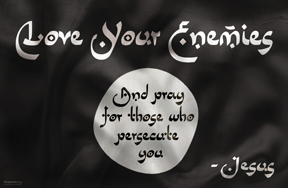
Image credit: Outreach Media
Whatever happens in the wash-up of the tragic events of the last 24 hours in Sydney, you can be sure that we’ll see the best of humanity displayed alongside its very worst. We’ll see expressions of love and solidarity for those who are the victims in this event, and for those at the margins of Australian society — the foreigners and sojourners in our mix, those who own religious beliefs outside the majority — and we’ll see expressions of hatred for that latter group.
The majority religious belief in Australia is nominal Christianity with a dash of moralism and a substantial serving of the idea that religion shouldn’t actually motivate anybody to act in any way. Let me distance true Christianity from that belief, just as the Islamic clerics in the media today are working to dispel the belief that this gunman’s actions were consistent with true Islam. It’s hard to distance anybody from any religion if religions are a choose your own adventure matter with no clearly understood consensus on exactly what such a religion involves. I can’t speak as an expert on Islam, but I’m certain that true Christianity involves truly following the Christ, Jesus. That’s where we get the name, it’s where we get our ethics, our system of belief, our key to interpreting our Scriptures.
Events like this are an opportunity for Australia to learn about the true nature of religion —not, in the sense, of learning facts about the substance of different religious beliefs, though this will no doubt happen as media outlets seek to fill air time and column inches — but to learn that at its core, religious belief compels religious people towards particular sorts of action.
There is an emerging picture of this gunman that suggests that his religious beliefs were a convenient addition to an already criminally deranged approach to life, there is very little sense that he speaks for the Islamic community, or even many other Australian Muslims. His actions have been roundly condemned by Islamic leaders. Calling oneself a cleric does not make one a cleric any more than rocking up outside random houses with for sale signs, without the permission of the owner, makes one a real estate agent.
No. Religion does motivate people. It’s not a private thing. It motivates one’s public actions. Whether you believe that you have no fate beyond the grave, your fate beyond the grave depends on the good and upright life you live now in obedience to your God, or your fate beyond the grave is determined by the death and resurrection of Jesus; the perfect king who came to pay the price for our inability to live that good and upright life, who now calls his followers to live as part of his kingdom by sacrificially loving others — these beliefs shape your actions.
Never more than now.
Never more than in a crisis and its wash up.
Never more than in the midst of the human experience of grief and turmoil.
With #prayforphil and now #prayforsydney I wonder if there has been more prayer, or at least more public calls for prayer, in the last month in Australia than in any other month in Australian history. People turn back to some sense of religiosity in these moments. It’s up to those people who are motivated by faith to show the fruit of that faith now.
Islamic clerics will spend the next few days distancing themselves from the actions of this deranged man. Rightly. Christian leaders will potentially spend the next few days distancing our religion from theirs. Wrongly. Let me be clear. I don’t believe Islam is a ‘religion of truth’ — I believe Jesus is the way, the truth, and the life. But I certainly don’t believe this gunman acted as a representative of Islam as it is practiced and understood by other Muslims in our community. Now is not the time to create distance, now is the time to demonstrate love for the marginal and the marginalised. Now is the time to live out words like this…
“You have heard that it was said, ‘Love your neighbour and hate your enemy.’ But I tell you, love your enemies and pray for those who persecute you, that you may be children of your Father in heaven.” —Jesus
“Those who consider themselves religious and yet do not keep a tight rein on their tongues deceive themselves, and their religion is worthless. Religion that God our Father accepts as pure and faultless is this: to look after orphans and widows in their distress and to keep oneself from being polluted by the world.” — James
So. Christian. Nominal or not. Now is your opportunity to put the words of Jesus into practice. To love those around you — whether you think they’re neighbours or enemies. People of other faiths should have no fear when confronted with a Christianity like this. A Christianity shaped by the Christ. Who showed that loving your enemies means laying down your life for them.
“This is how God showed his love among us: He sent his one and only Son into the world that we might live through him. This is love: not that we loved God, but that he loved us and sent his Son as an atoning sacrifice for our sins. Dear friends,since God so loved us, we also ought to love one another. No one has ever seen God;but if we love one another, God lives in us and his love is made complete in us.” — John
Pray for the families grieving the loss of their loved ones.
Pray for the police and politicians who dealt with this situation and must now deal with whatever fallout these events bring.
Pray for our nation, that we would, at this time, be defined by the religion we claim to own when we’re filling out our census form.
This, prayer, is part of the outworking of religious belief. But I don’t know of any place in the Bible where we’re called to pray, but not called to match our prayers with acting accordingly.
